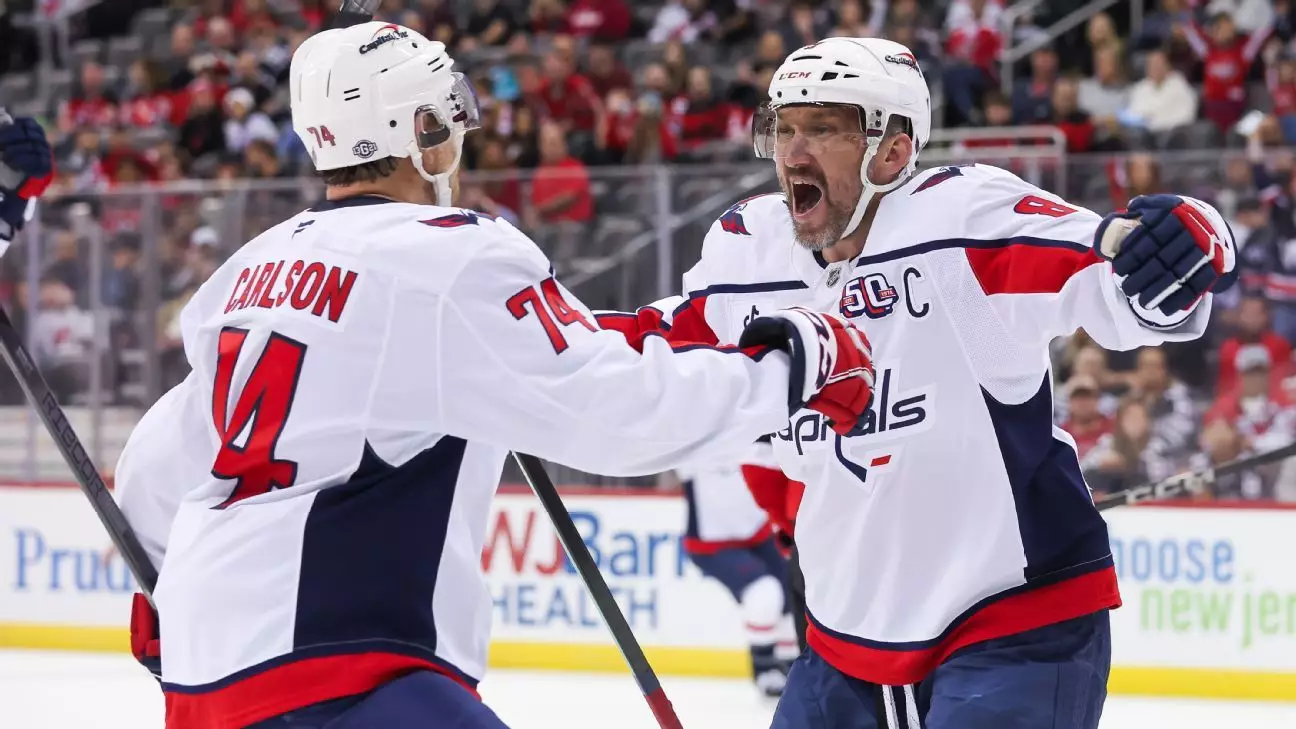The Washington Capitals recently faced an unexpected setback with the news that their captain, Alex Ovechkin, has sustained a fractured left fibula. The injury is projected to sideline Ovechkin for four to six weeks, significantly impacting both his pursuit of Wayne Gretzky’s all-time NHL goals record and the Capitals’ performance in the competitive Metropolitan Division. With Ovechkin already having netted 868 career goals and aiming for Gretzky’s 894, the timing of this injury raises concerns about the team’s future while Ovechkin is sidelined.
Ovechkin’s injury came as a shock not just to fans but also to his teammates. Having missed only 35 games in his illustrious two-decade career, his resilience has long been a hallmark of his playing style. Following an unfortunate shin-on-shin collision during a game against Utah, the visuals were alarming enough to suggest serious injury. Confirmed later as a fibula fracture, this injury type can be especially challenging to recover from, as it requires both physical healing and mental confidence before athletes can re-engage in robust gameplay.
Teammate Tom Wilson’s reaction reflects a shared disbelief within the locker room. Feeling the loss of their captain emotionally and psychologically, Wilson noted that many players have never experienced Ovechkin’s absence due to injury. This shared sentiment underscores how integral Ovechkin is not only statistically but also in building camaraderie and morale among his teammates.
The Capitals are currently basking in a relatively successful season, positioned second in the Metropolitan Division and displaying an impressive offensive record with an average of 4.33 goals per game. Ovechkin’s absence, however, raises questions about the team’s ability to replicate that scoring prowess without their leading goal-scorer.
With Ovechkin out of the lineup, coach Spencer Carbery is challenged to recalibrate his offensive strategy. Potential changes in the forward lines may see players like Connor McMichael and Pierre-Luc Dubois take on new roles. Notably, Dubois has been a disappointment in terms of goal production, only managing a singe goal so far this season despite being expected to contribute significantly. The offensive burden is likely to shift towards other emerging talents such as McMichael and Protas, both of whom have delivered commendable performances, yet replicating Ovechkin’s prolific scoring would be a tall order for any player.
Before his injury, Ovechkin was pacing for potentially a career-high 68 goals this season, a total that would have placed him squarely in pursuit of shattering Gretzky’s long-standing record. Relying on a recovery timeline that could see Ovechkin return to play by December 20—if everything progresses smoothly—he faces the daunting task of consistently scoring nearly half a goal per game to remain on track to pass Gretzky by the end of the season. Should he return later, that target only becomes more formidable.
Losing his presence for 13 to 18 games distinctly alters the rhythm of a squad initially expected to push for a playoff spot. It also presses the urgency on remaining players to step up and face not just the challenges on the ice, but also carry an emotional weight in Ovechkin’s absence.
As the Capitals navigate this uncertain period, leadership will play an essential role in maintaining team morale. With Ovechkin having contributed significantly to the team’s success thus far, his absence might lead to an intangible vacuum in the dressing room. Longtime teammate John Carlson has recognized the psychological boost that Ovechkin’s scoring brings to the squad, suggesting that passion and motivation could wane without their captain’s inspiring presence.
The onus now rests on Washington’s veteran players to foster confidence in a team that had rallied around Ovechkin’s scoring chase. Motivating one another to continue pushing forward regardless of setbacks will be crucial, and finding ways to build upon the collaborative effort previously bolstered by Ovechkin’s record-breaking goal pursuit will be vital in the days to come.
While Alex Ovechkin’s injury represents a major obstacle for the Capitals, it also offers an opportunity for growth among younger players and a test for veteran leadership. With grit and determination, the Capitals can confront this challenge head-on by harnessing their collective talent to sustain their competitive edge in a tough NHL landscape. The road ahead may be fraught with uncertainty, but teams have often emerged unfamiliar yet united through trials—perhaps this could be just what Washington needs to solidify its roster in the long run.


Leave a Reply